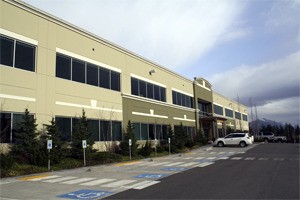The broad second-floor expanse of the big, beige Kendall Lake building on Douglas Avenue is mostly empty now. That’s expected to change in a few months, when its suites become home to an enterprise wholly new to Snoqualmie Ridge—a King County divisional headquarters.
In a bid to move closer to the bulk of its permit business, the county’s Department of Development and Environmental Services wants to relocate its 98-person main office from Renton to Snoqualmie, as early as this summer. The county is two months into negotiations with Kendall Lake owners Meriwether Partners of Seattle for an estimated $300,000 lease, about half of what the county pays for its current facility—a place DDES Director John Starbard likens to a gloomy DMV.
The move, announced February 6 in Executive Dow Constantine’s State of the County address, is part of an effort to improve customer service at DDES.
When Starbard started at the department two years ago, such a move was just one of a long list of options looked to give the division a healthier bottom line.
But with King County’s large cities wrapping up their big annexations, Starbard said the decision is timely.
“We’re getting out of the urban business,” he said.
With the county dealing with chronic budget shortfalls, the cost of department’s Renton headquarters—$1.2 million in 2010, about $800,000 now—appears too much to bear. Starbard said the Kendall Lake space—21,000 square feet at 35030 S.E. Douglas St— is expected to be around $300,000 annually.
It’s also a lot closer to unincorporated King County’s center of gravity, where DDES does most of its business—which, Starbard reckons, is somewhere along State Route 18.
The county’s core business, according to Starbard, has moved away from large corporations in Seattle and Bellevue and their mammoth plats.
“For years and years, major developers were our bread and butter,” he said. “In the rural area, we won’t be doing those kinds of plats.”
Instead, the core customer will be the smaller rural landowner who wants to improve and manage residential, forest or agricultural property.
“Already, we do more permits by volume in the rural area than in the urban area—it’s two-to-one,” Starbard said.
Staff and residents used to driving to Renton will have to adjust, but Starbard says South County residents “can hop on SR 18 and drive to our front door.”
“Staff have been aware of this potential for nine months,” he added. “I really believe that getting onto 18 and having a straight drive to the new office is going to be as convenient or more, to getting in the mess of (Highway) 405 and 167.
New spaces
In selecting the Ridge, the county contracted with a commercial real estate consultant, who scoped out 17 prospective spaces on the Interstate 90 corridor from Issaquah going east. Snoqualmie was the finalist, and the county has been negotiating with Meriwether Partners for two months (Meriwether bought the building from OPUS Northwest last year for $5 million).
One of the county’s requests for the site is for their workspace to be as open as possible. One of the disadvantages of DDES’ current site in Renton is that it’s “really chopped up” into what Starbard describes as pods.
“The space doesn’t encourage collaboration, it kind of encourages isolation,” he said. “The first-time customer experience is not very good. The glass is dark, the lobby is gloomy… a little bit like the DMV.”
The new DDES headquarters will have what Starbard describes as a “generously proportioned” customer assistance center, or hub, and wider, more open spaces for collaboration.
Other changes coming to DDES have less do with physical space. The county is bringing out new permitting software, in which permits can be applied for and paid for online. Many will be able to be issued online—customers won’t have to leave home, Starbard said.
With details of the Ridge lease still being negotiated, a final decision to move must be approved by the King County Council. However, Starbard said the advantages of the move make approval very likely.
Snoqualmie Mayor Matt Larson is happy with the prospect of nearly 100 county employees working and spending in this city.
Snoqualmie and the county haven’t always seen eye to eye—witness disagreement in 2011 over bridge infrastructure to be added to the city by a planned Weyerhaeuser mill site annexation. A local DDES presence may not make much difference in that annexation—Larson expects that to finalize before summer and before the headquarters moves—but it could, later on, as the future of the Interstate 90-Highway 18 interchange takes shape.
“I welcome the opportunity to have county departments be more grounded in the areas they’re managing,” the mayor said. “It’s going to do nothing but improve their understanding of the complexity of land issues out here.”
• You can learn more about what DDES does at http://www.kingcounty.gov/property/permits.aspx


